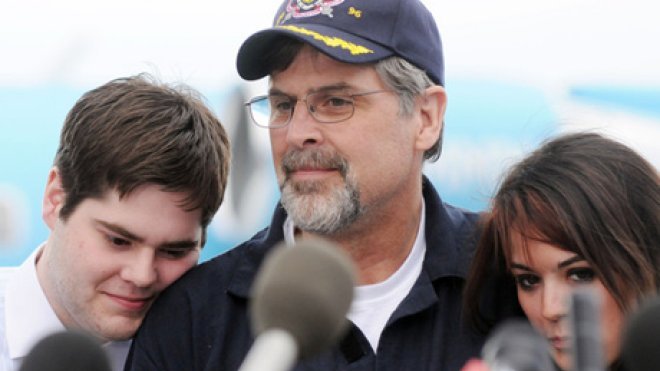On the High Seas Near the Horn of Africa, a 21st Century Pirate Tale
Famed Maersk Alabama Captain Richard Phillips recounts his April 2009 encounter with Somali pirates and his rescue by U.S. Navy SEALs

When Bristol’s venerable Herreshoff Marine Museum invited Capt. Richard Phillips – a legendary name in maritime history following his capture by Somali pirates from the Maersk Alabama in 2009 – to share his story, they knew they would need a larger event space.
For students, faculty and staff at Roger Williams University, that meant the chance to host the Herreshoff Museum and its distinguished guest speaker on campus on the evening of Thursday, March 8, 2012. In front of a packed house, Capt. Phillips didn’t disappoint.
Chronicling the five-day encounter in April 2009, Phillips said that as the Maersk Alabama embarked from Salalah, Oman, en route to Mombasa, Kenya, the crew was fully aware of the risk of pirate attack.
“I’ve always told my crew that attack was a matter of when and not if,” he said, “and that the cavalry wasn’t going to ride to the rescue.”
While they hoped for the best, they planned for the worst. The worst came quickly.
“Picture, if you will, the darkness of that very night,” Phillips said. “And a voice coming over our ship’s radio, sounding very eerie. Saying Somali pirate, coming to get you. Somali pirate, coming to get you. This is what we heard the night before the incident.”
The pirates attacked and gained entry to the Maersk Alabama, but everyone on board except Phillips and a few crew members had followed protocol and locked themselves in safe rooms. Alone with the pirates, Phillips said that he was clear about his responsibility – to protect his crew and protect his ship.
“For me to leave my ship and get on the boat with the pirates was not an act of surrender,” he said. “It was not something I view as an act of heroism. It was my strategy, my action plan and my duty.”
What followed was four days on a small lifeboat with four pirates. Not pleasant, as you might imagine. Eventually, the U.S. Navy intervened. With one pirate aboard a Navy ship negotiating, a team of U.S. Navy SEALs opened fire and killed the three pirates on the lifeboat.
“It seemed like it went on for a long time, even though it was probably only one or two seconds,” Phillips said. “And then, there was silence. After days of taunting heat and torture, there was just nothing. Finally, a voice – are you alright? An American voice.”
Phillips says the real heroes of the story are those Navy SEALs who risked their lives to save his. Watching them in action – and learning a lot about his own character during the ordeal – left him with three lessons that he now shares as he recounts his story.
“First, you are much stronger than even you realize. Second, the only time that all is lost is when we choose to give up. And third, if we come together as a dedicated, motivated team, we can overcome most any obstacle or solve most any problem.”
According to Phillips, those lessons can prove useful in many situations.
“Whether it’s on the seas that I encounter as captain of a ship or the changing seas of business and economy, we’re all riding an ever-shifting wave,” he said. “You are better off to face that with a well-trained, committed crew than all by yourself, alone.”